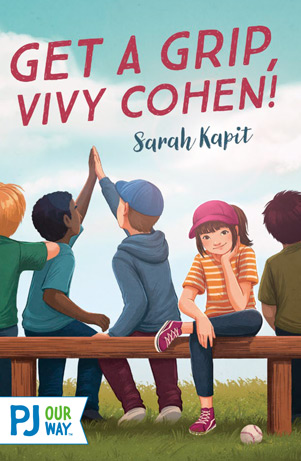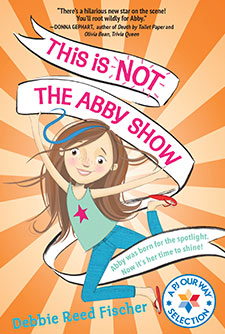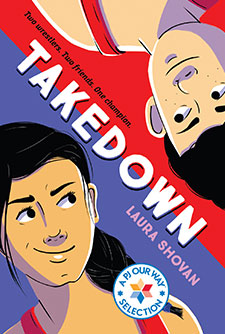Get a Grip, Vivy Cohen!
Vivy Cohen throws a mean knuckleball. But girls don’t play baseball, especially not girls with autism. Can Vivy prove to her family — and herself — that she has what it takes to get in the game?
Average Rating
( hint: Login to leave a review! )
191 Reviews
Leave Review
What the Book Is About
Jewish Content & Values
Positive Role Models
Content Advisory
Talk It Over
More for You
What the Book Is About
Vivian Jane Cohen’s favorite baseball player is VJ Capello, and not just because the share the same initials. VJ is a knuckleballer, which is exactly what Vivy wants to be! But Vivy isn’t just a girl. She’s a girl with autism, and her mom is worried that she can’t handle the stress of playing on a Little League team.
When her social skills teacher makes her write a letter to someone, Vivy writes to VJ. When VJ writes back, he becomes a source of support and advice as Vivy navigates the challenges getting her mom to understand her, dealing with the team bully, and convincing her parents to let her play again after an accident on the field.
With the support of VJ, her new friend Alex, and her brother Nate, Vivy learns that there are many ways to be different: VJ is one of the few Black catchers in major league baseball, Alex is Mexican, and Nate comes out as gay to his family. As Vivy learns that she doesn’t have to face every challenge on her own, she realizes just how strong she truly is.
When her social skills teacher makes her write a letter to someone, Vivy writes to VJ. When VJ writes back, he becomes a source of support and advice as Vivy navigates the challenges getting her mom to understand her, dealing with the team bully, and convincing her parents to let her play again after an accident on the field.
With the support of VJ, her new friend Alex, and her brother Nate, Vivy learns that there are many ways to be different: VJ is one of the few Black catchers in major league baseball, Alex is Mexican, and Nate comes out as gay to his family. As Vivy learns that she doesn’t have to face every challenge on her own, she realizes just how strong she truly is.
Jewish Content & Values
-
Vivy and her family are Jewish; they belong to a Reform temple and attend holiday celebrations there. Vivy attends a Hebrew school program for kids with autism, and she is starting to prepare for her bat mitzvah.
-
After a difficult email exchange with VJ, Vivy thinks about what she has learned from her rabbi about apologies and forgiveness.
Positive Role Models
-
Vivy Cohen is an insightful, hard-working girl who is also a supportive friend and sister.
-
VJ Capello is one of the few Black pitchers in the Major League. He is kind and supportive to Vivy, and he also learns and grows from as a result of their friendship.
-
Alex Carrillo, Vivy’s new friend and her catcher, is kind, supportive, and encouraging.
-
Vivy’s parents are protective, caring, and ultimately willing to learn from Vivy’s perspective.
Content Advisory
Kyle, the coach’s son, is a bully who calls Vivy “monkey girl” and mocks her for having autism. Vivy gets hit in the head by a line drive and sustains a mild concussion.
Talk It Over
Kyle, the coach’s son, calls Vivy “monkey girl,” leaves a mean note in her bag, and put gum in her mitt. Over the course of several emails, VJ encourages Vivy to tell her parents or her coach about the bullying, but Vivy chooses not to. Do you think kids should tell adults about bullies? Why or why not?
More for You
Vivy’s father often says that his two religions are Reform Judaism and baseball. He's not alone. For decades, Jews looking to assimilate into American culture have found a foothold in the democratizing force of baseball. However, as Bradford Pilcher notes in his article for My Jewish Learning, “the connection between Jews and baseball has always been strongest at those moments when great players have put their Jewish identity ahead of their performance on the field.” Hank Greenberg and Sandy Koufax are two Jewish players who both made the decision to sit out World Series games that took place on the high holy day of Yom Kippur.
What the Book Is About
What the Book Is About
Vivian Jane Cohen’s favorite baseball player is VJ Capello, and not just because the share the same initials. VJ is a knuckleballer, which is exactly what Vivy wants to be! But Vivy isn’t just a girl. She’s a girl with autism, and her mom is worried that she can’t handle the stress of playing on a Little League team.
When her social skills teacher makes her write a letter to someone, Vivy writes to VJ. When VJ writes back, he becomes a source of support and advice as Vivy navigates the challenges getting her mom to understand her, dealing with the team bully, and convincing her parents to let her play again after an accident on the field.
With the support of VJ, her new friend Alex, and her brother Nate, Vivy learns that there are many ways to be different: VJ is one of the few Black catchers in major league baseball, Alex is Mexican, and Nate comes out as gay to his family. As Vivy learns that she doesn’t have to face every challenge on her own, she realizes just how strong she truly is.
When her social skills teacher makes her write a letter to someone, Vivy writes to VJ. When VJ writes back, he becomes a source of support and advice as Vivy navigates the challenges getting her mom to understand her, dealing with the team bully, and convincing her parents to let her play again after an accident on the field.
With the support of VJ, her new friend Alex, and her brother Nate, Vivy learns that there are many ways to be different: VJ is one of the few Black catchers in major league baseball, Alex is Mexican, and Nate comes out as gay to his family. As Vivy learns that she doesn’t have to face every challenge on her own, she realizes just how strong she truly is.
Jewish Content & Values
Jewish Content & Values
-
Vivy and her family are Jewish; they belong to a Reform temple and attend holiday celebrations there. Vivy attends a Hebrew school program for kids with autism, and she is starting to prepare for her bat mitzvah.
-
After a difficult email exchange with VJ, Vivy thinks about what she has learned from her rabbi about apologies and forgiveness.
Positive Role Models
Positive Role Models
-
Vivy Cohen is an insightful, hard-working girl who is also a supportive friend and sister.
-
VJ Capello is one of the few Black pitchers in the Major League. He is kind and supportive to Vivy, and he also learns and grows from as a result of their friendship.
-
Alex Carrillo, Vivy’s new friend and her catcher, is kind, supportive, and encouraging.
-
Vivy’s parents are protective, caring, and ultimately willing to learn from Vivy’s perspective.
Content Advisory
Content Advisory
Kyle, the coach’s son, is a bully who calls Vivy “monkey girl” and mocks her for having autism. Vivy gets hit in the head by a line drive and sustains a mild concussion.
Talk It Over
Talk It Over
Kyle, the coach’s son, calls Vivy “monkey girl,” leaves a mean note in her bag, and put gum in her mitt. Over the course of several emails, VJ encourages Vivy to tell her parents or her coach about the bullying, but Vivy chooses not to. Do you think kids should tell adults about bullies? Why or why not?
More for You
More for You
Vivy’s father often says that his two religions are Reform Judaism and baseball. He's not alone. For decades, Jews looking to assimilate into American culture have found a foothold in the democratizing force of baseball. However, as Bradford Pilcher notes in his article for My Jewish Learning, “the connection between Jews and baseball has always been strongest at those moments when great players have put their Jewish identity ahead of their performance on the field.” Hank Greenberg and Sandy Koufax are two Jewish players who both made the decision to sit out World Series games that took place on the high holy day of Yom Kippur.




